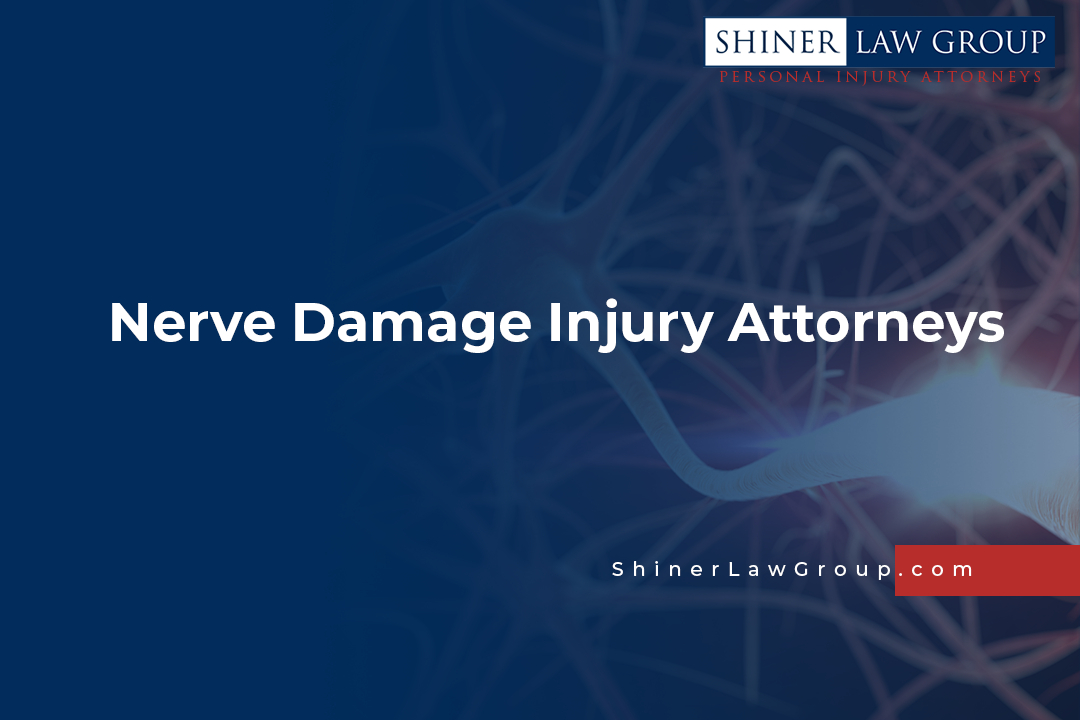The nervous system is utilized in each and every function of your body, from sensing cold and heat, controlling the muscles to regulating breathing. Nerve pain or damage can cause disturbances in the proper functioning of your body. There can be various causes of nerve damage, including nerve damage caused by negligence, falling or slipping, or other disorder. There are a number of different kinds of nerve damage which can cause multiple symptoms and might require different kinds of treatments.
Symptoms of Nerve Damage
Nerve damage can result in various symptoms, depending on the type and location of the affected nerve. You might experience nerve damage in your spinal cord, in your brain or in your hand; each of which can cause different symptoms.

If you are experiencing autonomic nerve damage then you might experience the following symptoms:
- Sexual dysfunction
- Bladder dysfunction
- Constipation
- Dry mouth and dry eyes
- Dizziness or lightheadedness
- Too much or too little sweating
- Lack of ability to sense pain in your chest, like heart attack or angina
Following symptoms might be experienced if you have motor nerve damage:
- Paralysis
- Twitching
- Muscle atrophy
- Weakness
If you have sensory nerve damage then the following symptoms might occur:
- Burning sensation
- Prickling or tingling sensation
- Numbness or compression
- Sensitivity
- Pain
In certain cases, individuals with nerve damage might have symptoms that may indicate more than two types of nerve damages. It is important to consult a medical expert to determine the right treatment option after a thorough examination. If your nerve damage is caused by an accident then it is important not only to consult your doctor immediately but also to seek legal assistance to help you recover damages.
Causes of Nerve Damage
Nerve damage can be caused due to various reasons. Following are some of the main causes of nerve damage and nerve pain:
Autoimmune Diseases
Various kinds of autoimmune diseases can cause nerve damage and its symptoms. These diseases include inflammatory bowel disease, lupus, myasthenia gravis, Guillain-Barré syndrome, and multiple sclerosis.
Cancer
This can result in nerve damage and nerve pain in various ways. For instance, a cancerous mass might crush or push against nerves or come cancers might lead to nutritional deficiencies that could impact the proper functioning of the nerves. Moreover, different types of radiation and chemotherapy might result in nerve damage or nerve pain in some patients.
Trauma or Compression
Anything which causes the compression or trauma of nerves can lead to nerve damage or nerve pain. This might include carpal tunnel syndrome, car crash injuries, pinched nerves and other sudden or forceful injuries caused by an accident or a fall.
Diabetes
More than 70% of diabetic individuals experience nerve damage; the chances increase with the progression of the disease. Diabetic neuropathy is a grave complication that affects all kinds of neurons. In this case, the most affected nerves are the sensory nerves, which result in numbness or burning sensation in the affected area. If you are diabetic and experience nerve damage or nerve pain symptoms then it is important to immediately consult your doctor as you might need immediate treatment.
Toxic Substances and Side Effects of Drugs
Different substances which an individual consumes unintentionally or intentionally might have the tendency to cause nerve damage or nerve pain. This can include medications, including chemotherapy for treating cancer and other drugs for treating HIV. Toxic substances ingested unintentionally or intentionally that can lead to nerve damage including mercury, arsenic, lead and other drugs.
Motor Neuron Disease
Motor neurons are the nerves present in your spinal column and brain, which help in communicating with the muscles all over your body. Various diseases can affect these nerves and cause nerve damage or nerve pain. These diseases may include Lou Gehrig’s disease or Amyotrophic Lateral Sclerosis (ALS).
Nutritional Deficiencies
Deficiencies of various nutrients including vitamin B12 and B6 might lead to symptoms of nerve damage or nerve pain, including burning sensation and weakness. These nutritional deficiencies, which can result in nerve damage, might also be caused after gastric surgery or with the excessive consumption of alcohol.
Infectious Diseases
Various infectious diseases might result in nerve damage, including hepatitis C, HIV, herpes viruses, and Lyme disease.
Your doctor can determine the cause and type of nerve damage you are experiencing and would recommend the best treatment options.
Surgery for Nerve Damage
Following are the two major nerve damage surgeries:
Nerve Decompression Surgery
This surgery aims to alleviate the pressures on your nerves. Certain nerves are more vulnerable to compression as compared to others because of the skeletal structure around them. This surgery is conducted to either make room for nerves in narrow spaces or to reduce the added pressure on the affected nerve, or both.
This surgery has two subtypes:
Spinal decompression – this surgery is done to treat issues caused by pressures on the nerves situated on the spine like spinal stenosis and herniated discs.
Peripheral decompression – this surgery is done to treat issues that are caused in places other than your spine like cubital tunnel syndrome in your elbow or carpal tunnel syndrome on your wrist.
The other nerve damage or nerve pain treat by nerve decompression surgery include:
- Tarsal tunnel syndrome
- Spondylolisthesis
- Sciatica
- Cubital tunnel syndrome
- Cauda equina syndrome
Your doctor can determine which nerve damage you are experiencing and whether this surgery is best solution for you.
Peripheral Nerve Surgery
The peripheral nerves send out sensory information, including temperature, pain, and touch, to your nervous system, which is situated in the spinal cord and brain. These nerves control your muscles and enable you to perform various voluntary functions like playing sports, typing, writing, eating, and speaking.
Damage to these nerves leads to loss or changes in sensations, paralysis or weakness. The weakness and changes in sensations depend on the type of nerves affected as well as the location of the nerve. Peripheral nerve surgery is needed to treat these issues, along with other neurological disorders like:
- Myopathic and neuropathic diseases
- Traumatic peripheral nerve injuries
- Ganglian cysts
- Neurofibromas
- Schwannomas
- Peripheral nerve tumors
- Meralgia paresthetica
- Supinator and pronator teres syndromes
- Pyriformis
- Thoracic outlet
- Carpal tunnel syndrome
Make sure you immediately consult your doctor if you are experiencing pain, swelling or other usual sensations, especially if you have been in an accident. Once you have received proper medical attention, it is recommended that you consult an experienced lawyer if the nerve damage has been caused due to someone’s negligence or to file a personal injury claim. Contact Shiner Law Group and get a free case evaluation of your case to determine the damages you might be able to recover.



